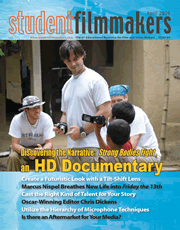Professional Motion Picture Production and Distribution NEWS
| Paula Brancato Shares Screenplay Writing Advice: The Seven Most Common Screenwriting Errors By StudentFilmmakers.com posted Apr 1, 2009, 06:25 |
 The Writers Place is featured in the April 2009 Edition of StudentFilmmakers Magazine, the # 1 Educational Resource for Film and Video Makers. Read the accompanying online article here.
The Writers Place is featured in the April 2009 Edition of StudentFilmmakers Magazine, the # 1 Educational Resource for Film and Video Makers. Read the accompanying online article here.
What is the most common mistake that you see in scripts?
Paula Brancato: The seven most common errors screenwriters, including novices and professionals, make in order of frequency are:
#1 Switching protagonists mid-stream. If your leading man/lady has fewer lines after page 20 and shows up on fewer and fewer pages, maybe even disappears altogether for ten pages at a time, you have switched protagonists and your screenplay will fail.
#2 Having a weak, passive leading lady/man. Maybe your protagonist is there on every page but just sits and watches or says inane things like, �Oh, my. That is not good,� while quietly sipping his or her beer. Not good. A protagonist must act. Onscreen we can only see action, not what is in a characters head. If he or she is thinking up a storm but the audience has no way to see it, the screenplay will fail.
#3 Having a weak, passive or nonexistent antagonist or one who arrives too late in the game. The protagonist can only be as strong and interesting as his or her antagonist, the person he pushes against, the person he fights, e.g. the joker in Dark Knight, who literally made that movie. An antagonist must be a very strong character, not an institution, not a feeling and not an idea, but a flesh and blood embodiment of antagonism, who shows up early and gives the protagonist an extremely hard time.
#4 Not enough conflict. Every scene, even in a comedy, must have conflict. Two people have to fight over something, each at the expense of the other, for a scene to come alive. What are they fighting over? How do they get in the way of one another trying to get it? Nice, agreeable characters make for very bad screenplays.
#5 Too much exposition. Talking heads are, mostly, boring on the screen. Show don�t tell. Use action, move characters through various unusual changes of scenery, if nothing else, anything you need to keep the story moving forward. Movies are moving pictures, so keep your scenes and characters moving along.
#6 Not enough action, even small actions. The audience can only tell the nature of a character in a play or screenplay by the way the character acts, the choices he or she does or does not make. The writer must dramatize what is in the character�s head with actions, because onstage or screen the audience cannot be inside the character�s head, the way one can, for instance, through the words of a novel. A character makes an important decision. How do we see that moment of decision-making? That action can be as small as a wink or as big as detonating an explosive device. Load up your scenes with action.
#7 Falling into the trap of feeling for the characters or having the characters feel, really hard, really good or really bad. What actors do is called acting, not feeling for a very good reason. Actors act, they don�t play feelings. What is the action that expresses the feeling your character has? Stay there, in the world of the visual, and you will create a great screenplay. Your job is to keep the action moving so the audience can see what your characters are made of and to follow your wonderful story.
What would you say are the most salable genres?
Paula Brancato: Everything is salable at a price. Horror, slasher, erotic and other genre movies do well in low budget and straight to video formats. Screenplays with a comic book and graphic novel feel can do well as animated movies. Character-driven screenplays may become blockbusters, like Erin Brockovich, or go straight to TV, depending on who plays the lead. Big tent pole movies generally require trademarked characters and or action/thriller settings that can ultimately be franchised: Star Wars I, Star Wars II, Star Wars III, etc. Every screenplay has its own route into production. Higher budget films generally pay writers more than lower budget films, as a writer get paid, like everyone else, based on negative cost.
What advice would you give to new and experienced writers looking to �sell� their scripts?
Paula Brancato: Read the screenplays of other successful writers who write in a similar genre. Deconstruct what they�ve done and try to emulate it, just like any artist worth his or her salt would do. Keep your own counsel but if 5 unrelated people say there is a problem on page 5, then there is problem on page 5. They may not know what the problem is. Over time you will learn enough about yourself and what is out there to know. Use every contact you have, and every contact of every contact, to help review and push your work forward. Join groups, even if you are an iconoclast. Sometimes even show up. Consider self-production. Consider teaching and ancillary related jobs (TV, radio, events, theatre, yes, even the William Morris mailroom). Go back to school, if you can afford it, to break into the business. Give back. The business is quid pro quo. Others will help you if you help them get along. Never give up � but do keep your day job. Most of all keep writing!
Please tell us about your contest coming up in April/May.
Paula Brancato: The Writers Place runs two screenwriting contests a year, one in April/May � the final deadline is May 15th � and one in October/November. We accept full-length screenplays, teleplay, pilots, musicals and shorts. Winners receive prizes, including cash awards, final draft software or cash equivalent, and a PR package worth over $5000. In addition, we do extensive mailings to our industry database of 45,000 for all TWP winners and finalists.
What are the prizes?
Paula Brancato: Our first place winner in the full-length competition receives the following amenities provided by InkTip.com: (1) An email announcement about your winning screenplay to Inktip's 6,500 industry professionals. (2) Placement of, as a minimum, your logline and synopsis on InkTip's password protected Web site. You also have the option for placement of a story treatment and/or your script. (3) Inclusion of a logline (pitch) of your winning screenplay in InkTip's printed publication, snail-mailed to roughly 5000 industry professionals.
We also publish our writers� success stories on a monthly basis. TWP winners and finalists have gone on to write for the New York Times, assume leadership positions in the literary and film community and produce their films through our industry contacts.
 Important Dates: Important Dates:Mark Your Calendars The Writers Place Spring Screenwriting Contest April 30th: Early deadline May 15th: Final deadline (additional $10 fee) June 15th: Finalists announced July 1st: Winners announced The Writers Place Winter Screenwriting Contest October 31st: Early deadline November 15th: Final deadline (additional $10 fee) December 15th: Finalists announced January 1st: Winners announced Enter at www.thewritersplace.org. |
Visit The Writers Place and Paula Brancato at www.thewritersplace.org/script_consultation.shtml and www.paulabrancatola.com.
Want a copy of this issue? Click here to get a copy of the April 2009 Edition of StudentFilmmakers Magazine.
Get best practices, insider techniques, and cutting-edge production stories on how to make motion pictures delivered right to your doorstep.
|